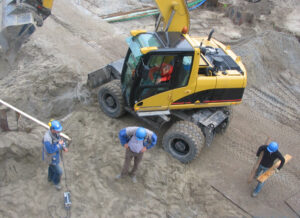In the world of construction management, the Construction Projects Manager is a key player. Their daily routine involves juggling various responsibilities, making critical decisions, and ensuring that projects run smoothly. In this article, we’ll take a closer look at a day in the life of a Construction Projects Manager.
The 5 Stages of Construction Projects
Construction projects typically follow five key stages:
Initiation
This is the planning phase, where project goals, scope, and feasibility are determined. Construction Projects Management work closely with stakeholders to define project objectives and outline a clear path to success. They assess potential risks and create a preliminary budget. During this phase, the Construction Projects Manager’s expertise is instrumental in setting the project’s direction.
Planning
In this stage, detailed project plans are developed. Construction Projects Managers create comprehensive schedules, allocate resources, and set realistic timelines. They coordinate with subcontractors, suppliers, and other team members to ensure everyone is on the same page. Effective planning is critical to keeping the project on track and within budget.
Execution
This is where the actual construction work takes place. Construction Projects Managers are hands-on during this phase, overseeing daily operations. They manage teams, resolve on-site issues, and ensure that the project adheres to safety and quality standards. Their leadership skills come to the forefront as they drive the project toward successful completion.
Monitoring and Controlling
Throughout the project, Construction Projects Managers continuously monitor progress. They track budgets, schedules, and quality, making adjustments as needed to keep the project on course. This involves regular site visits, data analysis, and effective communication with all stakeholders. It’s a dynamic phase where their ability to stay proactive is crucial.
Closing
Once construction is complete, the project enters the closing phase. Construction Projects Managers ensure that all deliverables are met according to the client’s specifications. They conduct final inspections, resolve any remaining issues, and prepare for the project handover. Client satisfaction is paramount during this phase, as a successful handover marks the culmination of the Construction Projects Manager’s efforts.
These stages provide a comprehensive overview of the Construction Projects Manager’s role throughout a construction project’s lifecycle.
Core Construction Project Management Processes
In addition to overseeing the five stages of construction projects, Construction Projects Managers are responsible for managing several core processes:
Resource Allocation
Efficiently allocating resources is vital for project success. Construction Projects Managers ensure that the right people, materials, and equipment are available when needed. This involves coordinating with suppliers, scheduling labor, and optimizing resource usage to avoid delays and cost overruns.
Budget Management
Construction Projects Managers are entrusted with managing project budgets. They track expenses, approve expenditures, and make financial decisions to keep the project within budget constraints. Their financial acumen is crucial for preventing overspending and maintaining profitability.
Risk Assessment and Mitigation
The construction industry is fraught with uncertainties, from unexpected weather events to regulatory changes. Construction Projects Managers proactively identify potential risks and develop strategies to mitigate them. Their ability to foresee and address challenges ensures project continuity.
Quality Assurance
Maintaining high-quality standards is non-negotiable in construction. Construction Projects Managers implement quality control processes, conduct inspections, and collaborate with teams to ensure that work meets specified standards. This focus on quality contributes to client satisfaction and project success.
Team Management
Managing a diverse workforce of skilled professionals, subcontractors, and suppliers requires strong leadership and communication skills. Construction Projects Managers build and lead effective project teams, fostering collaboration and productivity.
These core processes are at the heart of construction project management, and Construction Projects Managers excel in these areas to ensure projects are executed smoothly and successfully.
Handling Construction Project Management Challenges
Construction Projects Managers face a range of challenges in their daily work, and their ability to navigate these challenges is a testament to their expertise:
Complex Coordination
Managing a construction project involves coordinating a myriad of moving parts, from subcontractors and suppliers to skilled workers. Ensuring seamless communication and collaboration among all stakeholders is a daily challenge. A delay in one aspect of the project can trigger a chain reaction, impacting timelines and budgets.
Risk Management
The construction industry is inherently risky. Construction Projects Managers must continually assess and mitigate various risks, such as weather-related delays, material shortages, or unexpected site conditions. Their proactive risk management strategies are key to keeping projects on track.
Resource Allocation
Efficiently managing resources, both human and material, is a delicate balancing act. Construction Projects Managers must ensure that the right people are in the right place at the right time and that materials are readily available. Striking this balance without overspending requires keen resource management skills.
Budget Adherence
Staying within budget is a constant challenge. Construction Projects Managers are responsible for tracking expenses, identifying cost-saving opportunities, and making budgetary decisions. They must find creative solutions to keep costs in check without compromising quality.
Client Expectations
Meeting client expectations can be demanding. Construction Projects Managers must communicate effectively with clients, manage their expectations, and address any concerns promptly. Client satisfaction is not just a goal but a measure of success in the construction industry.
Navigating these challenges requires a blend of technical know-how, leadership, and problem-solving skills. Construction Projects Managers tackle these obstacles head-on to ensure that projects progress smoothly.
Achieving Success: Tips from Construction Project Managers
Experienced Construction Projects Managers have valuable insights into achieving success in their roles. Here are some tips and strategies they often employ:
Effective Communication
Clear and open communication is the cornerstone of successful construction management. Construction Projects Managers prioritize communication with their teams, subcontractors, suppliers, and clients. Regular updates and transparent discussions help keep everyone aligned.
Proactive Problem-Solving
Construction Projects Managers anticipate issues before they escalate. They identify potential bottlenecks and challenges early on and develop contingency plans. This proactive approach minimizes disruptions and keeps projects on track.
Adaptability
Flexibility is key in construction management. Projects can face unexpected changes, from design alterations to weather-related delays. Construction Projects Managers adapt quickly to shifting circumstances, adjusting plans and schedules as needed.
Attention to Detail
Meticulous attention to detail ensures that nothing falls through the cracks. Construction Projects Managers scrutinize project plans, budgets, and schedules to catch errors or inconsistencies before they become problems.
Team Empowerment
Empowering team members and subcontractors fosters a sense of ownership and accountability. Construction Projects Managers delegate responsibilities and trust their teams to carry out tasks efficiently.
Continuous Learning
The construction industry evolves, with new technologies and best practices emerging. Construction Projects Managers invest in ongoing learning and professional development to stay current and bring innovative solutions to their projects.
Client Focus
Understanding and exceeding client expectations is a top priority. Construction Projects Managers actively engage with clients, ensuring they feel heard and valued throughout the project.
These tips reflect the wisdom gained from years of experience in construction management. Implementing these strategies contributes to successful project outcomes and satisfied clients.
The Future of Construction Management
The construction industry is evolving, and Construction Projects Managers are at the forefront of these changes. Here are some trends and developments shaping the future of construction management:
Digital Transformation
Technology is revolutionizing construction management. Construction Projects Managers increasingly rely on digital tools like Building Information Modeling (BIM), project management software, and data analytics to streamline processes and improve efficiency.
Sustainability and Green Building
There is a growing emphasis on sustainability in construction. Construction Projects Managers play a vital role in implementing Eco-friendly practices, such as green building materials and energy-efficient designs, to meet environmental standards.
Off-Site Construction
Off-site construction methods, such as modular construction, are gaining traction. Construction Projects Managers need to adapt to this shift in construction practices and ensure seamless coordination between on-site and off-site work.
Safety Enhancements
Safety remains a top priority. Construction Projects Managers are leveraging technology, such as wearable and sensors, to enhance safety measures and reduce accidents on construction sites.
Globalization
Construction projects increasingly involve international teams and stakeholders. Construction Projects Managers need to navigate the complexities of global projects, including cultural differences and regulatory challenges.
Remote Project Management
The COVID-19 pandemic accelerated the adoption of remote work in construction management. This trend is likely to continue, with Construction Projects Managers using digital tools to manage projects from afar.
Diverse Workforce
The construction industry is becoming more diverse. Construction Projects Managers are adapting to manage multi-generational and culturally diverse teams effectively.
As construction management continues to evolve, Construction Projects Managers will need to embrace these trends and innovations to stay competitive and deliver successful projects.
FAQs:
What are the common challenges faced in the construction industry?
Common challenges in construction include project delays, cost overruns, labor shortages, safety issues, regulatory compliance, and changing weather conditions, among others.
How do project delays affect construction projects?
Project delays can result from various factors like weather, material shortages, design changes, or unforeseen issues. They can lead to increased costs, contractual disputes, and disruption of project timelines.
What is the impact of cost overruns in construction?
Cost overruns occur when a construction project exceeds its budget. They can strain finances, lead to disputes with stakeholders, and may require additional funding to complete the project.
What safety challenges exist in construction?
Construction sites are inherently risky environments. Safety challenges include accidents, injuries, and fatalities. Ensuring worker safety requires strict adherence to safety protocols and regulations.





